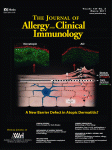
Celiac.com 05/20/2011 - Over the years, researchers have been discovering more and more about celiac disease, an autoimmune disease which is caused by gluten, a protein found in wheat, barley, and rye. Studies have linked the disease to a variety of other medical conditions, such as irritable bowel syndrome, rheumatoid arthritis, and osteoporosis. Researchers have now found a connection between celiac disease and asthma.
Asthma is chronic lung disease that causes the passages of the lungs to become inflamed and narrowed, resulting in wheezing, shortness of breath, tightness in the chest area, and coughing. It often begins in childhood, and according to the U.S. Department of Health and Human services, more than 22 million people suffer from the condition. Many studies have linked asthma to airborne allergens, but doctors have begun to look into food culprits as well. One such study shows a connection to celiac disease, which isn’t an allergy but rather an autoimmune response to gluten.
In a study published in the Journal of Allergy and Clinical Immunology, European researchers found that celiac individuals were 60 percent more likely to develop asthma than those without the condition. Celiac disease affects approximately one percent of the population and without treatment, which is a gluten-free diet, can cause a variety of physical and mental symptoms including chronic fatigue, headaches, malnutrition, chronic headaches, and stomach problems.
Dr. Jonas Ludvigsson of Orebro University Hospital and the Karolinska Institutet in Sweden and his colleagues compared more than 28,000 Swedish celiac patients to more than 140,000 similar people without the disease. The study concluded that only a link between the two could be demonstrated, not that one condition causes the other; the researchers weren’t able to identify the reason for the association.
One possible factor may be Vitamin D. According to Reuters Health, Dr. Ludvigsson said in an email, "Personally, I think the role of vitamin D deficiency should be stressed." Vitamin D has been demonstrated to be a factor in the development of tuberculosis and osteoporosis, both of which celiacs are more likely to develop. In celiac disease, gluten causes an autoimmune reaction that causes the immune system to attack the small intestine, specifically the villi, the finger-like structures that absorb the nutrients from food; thus celiac patients usually exhibit deficiencies in vitamins and minerals. If a celiac patient isn’t getting enough vitamin D into their system, according to Dr. Ludvigsson, the risk for asthma disease may be increased.
According to Dr. Ludviggson, Swedish celiac patients adhere well to the gluten-free diet. The study didn’t determine how closely the 28,000 subjects were sticking to their diets, but Ludviggson told Reuters health, "Generally dietary compliance is high in Sweden, so I actually believe that also patients with good adherence are at increased risk of asthma.”
It is recommended that people who suspect they may have celiac disease or asthma should consult with a qualified medical practitioner for testing, diagnosis, and treatment.
Resources:
- U.S. Department of Health & Human Services: Open Original Shared Link
- Gluten Free Society: Gluten Sensitivity Increases the Risk for Asthma: Open Original Shared Link
- Reuters: Asthma linked to celiac disease: Open Original Shared Link







Recommended Comments